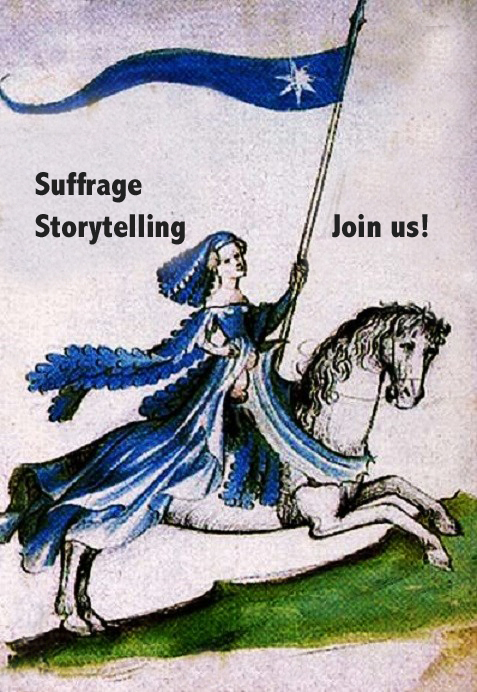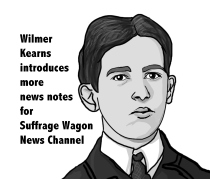Season 1 of “Suffrage Storytelling” reveals the lives of young women in 1903 on Vimeo.
Whenever Edna Buckman could, she took the train to center city Philadelphia to meet her best friend Bess at the Market Street teahouse. Bess, the rebel, loved telling Edna stories after they took their seats and ordered from the menu. Edna especially liked hearing Bess talk about George Sand, the French woman novelist who wore men’s clothes and adored attention from her many lovers, both women and men.
When Bess strolled down Market Street, she showed Edna how she imagined George Sand walked with a cocky swagger. Bess insisted that Sand made fun of men on their high horses, right to their faces. Edna believed Sand felt entitled to do whatever she pleased because she traveled in aristocratic creative circles and could get away with being different.
“People like us can’t turn into George Sand. It will only come back to haunt us,” Edna said. “Who cares anyway?” Bess asked, throwing up her hands and glancing around at the other teahouse patrons who couldn’t hear or understand their conversation. Bess could be blunt when explaining her problems to her best friend.
MR. WEISS DIDN’T MINCE WORDS ABOUT HIS DAUGHTER’S BEHAVIOR
Mrs. Weiss had been horrified after daughter Bess delivered a tirade about women’s second-class roles at home at the Sunday dinner table in front of all the relatives. This is why Mrs. Weiss supported Philip in his plan to take Bess out of the pool of young single women by marrying her. Philip, an old friend of the Weiss family, had been like a distant cousin to Bess. She’d grown up seeing him at the homes of family and friends on special occasions. Of all the eligible young men in Germantown, Philip couldn’t be considered the best prospect for marriage, but he wasn’t the worst either.
“Philip’s nice, but I’d rather train to be a teacher than get married,” Bess said.
“Maybe there’s a special arrangement for a man and woman to agree on. Family, yes. And freedom too,” Edna suggested.
“Philip’s too much of a traditional man,” Bess responded as the two women ordered another round of oolong tea.
THE BOOK THAT GOT BESS IN TROUBLE AT HOME
The day of their meeting at the Market Street teahouse, concern about Bess and her parents took up most of the conversation. Not long before, Bess got in trouble after her mother found Mary Wollstonecraft’s controversial 1798 book, A Vindication of the Rights of Woman under the bedroom mattress. Bess had borrowed the work from the city library and read it twice. Then she wrapped it in paper, tied it with string, and passed it around among her classmates at school. This was bad enough when her father found out. But when Bess didn’t show any interest in marrying Philip, her parents lowered the boom and confined Bess to her room after school and weekends for a month.
Mr. Weiss wasn’t supportive of his daughter’s plan to become a teacher. He believed higher education beyond high school would be wasted on a young woman. Mr. Weiss emphasized that he wouldn’t pay a cent for his daughter’s advanced education. He was furious that the school Bess attended with Edna, Friends Central in Philadelphia, had exposed Bess to unconventional ideas. In his opinion, women were created by God to be subordinate to men, and the Bible said so. Quakers like Edna’s family believed that boys and girls, men and women, were equal under the eyes of heaven, something Mr. Weiss didn’t know when he caved into pressure from his daughter that she get a high school education.
“WOMEN SHOULD STAY IN THEIR PLACE,” MR. WEISS SAID
The Weiss family weren’t Quakers, but they lived in a Germantown neighborhood in Philadelphia with Quakers like the Buckman family, people they liked. When Bess decided she wanted to attend a Quaker secondary school with Edna, the idea didn’t seem so out of the ordinary to her father. Mrs. Weiss believed some education made young women better wives. Overall, Mrs. Weiss agreed with her husband’s position and lectured Bess about how men functioned best in their “sphere” of the larger world. Women’s special qualities of purity and morality qualified them for their own realm of responsibility back at home with the family, Mrs. Weiss added.
If Bess became argumentative, her father made his position clear: “Women should stay in their place.” Her mother called politics a “dirty business” because she believed women could be contaminated by too many thoughts about voting. Correcting the stain created by men in society could be addressed by women without a change in the law to extend voting rights. Mrs. Weiss called this “municipal housekeeping,” or community reform work, the highest form of work suitable for women’s attention.
BESS AND EDNA ARGUED ABOUT MARRIAGE
“Marriage is a bad deal for women,” Bess emphasized in her teahouse talk with Edna as they finished the last crumbs of the scones on their plates. “I’m holding out to meet the special man who will love and support me,” Edna responded.
Bess didn’t comment. Being an outsider who questioned the world as it was couldn’t have been easy for Bess when even her best friend Edna didn’t embrace all her ideas. Several school chums of Bess and Edna agreed with society’s prevailing view that politics were corrupt and women had enough to do caring for family affairs without adding more to their responsibilities.
With each passing year, however, ideas about women’s roles were changing as more Friends’ Central women graduates enrolled in the few colleges and universities open to them. Some of these young women believed that since patriarchy constituted the devil they knew, women voting could turn out to be they devil they didn’t know. If Bess and Edna examined these issues in their own lives, they weren’t alone in struggling with a fundamental issue facing their generation: To what extent would they put themselves on the line to be free? Bess represented a hard liner. Edna hoped to find a middle way.
EDNA BELIEVED LUCRETIA AND JAMES MOTT HAD WORKED OUT EQUAL PARTNERSHIP IN THEIR MARRIAGE
Bess identified with radically-minded women such as suffrage activist Susan B. Anthony who didn’t mind being called a “war horse,” “battleaxe,” and “unsexed.” Anthony believed that women’s freedom was more important than worrying about being called nasty names. Words like war horse and unsexed were used often by men like Mr. Weiss to label women who supported social equality and freedom. Bess described herself as a restless “New Woman,” a category of individuals who had no intention of finding self fulfillment within the limitations of “true womanhood” and marriage.
Only Lucretia Mott’s husband, James Mott, represented one of the few examples Edna found of an ideal Quaker man who could be himself and yet uphold his partner’s dignity and right to a full expression of power in the affairs of the material world. In Edna’s mind, the Motts had demonstrated the potential of equal partnership at the Seneca Falls Convention in 1848 when both participated fully in the landmark women’s rights convention. In 1903, Edna hadn’t met Wilmer Kearns yet. After she did, the couple met at the Market Street teahouse as they got to know each other better. Teahouses represented a refuge, not only for Edna, Bess and Wilmer, but for many young people of their generation.
STORY RESOURCES –GET OUT THE WIKIPEDIA: George Sand. Germantown. Lucretia Mott. Friends’ Central. Quaker. Seneca Falls Convention of 1848. Mary Wollstonecraft. Susan B. Anthony. James Mott.
Follow the entire “Spirit of 1776” suffrage storytelling series.
 Follow Suffrage Wagon News Channel on Facebook and Twitter. Quarterly newsletters just by signing up. Suffrage Wagon News Channel has a video platform on Vimeo.
Follow Suffrage Wagon News Channel on Facebook and Twitter. Quarterly newsletters just by signing up. Suffrage Wagon News Channel has a video platform on Vimeo.
Follow SuffrageCentennials.com for news and views about upcoming suffrage centennials. “Choose it and Use it” is a video reminding us of how the past is linked to what we do today and its impact on the future.





0 Comments